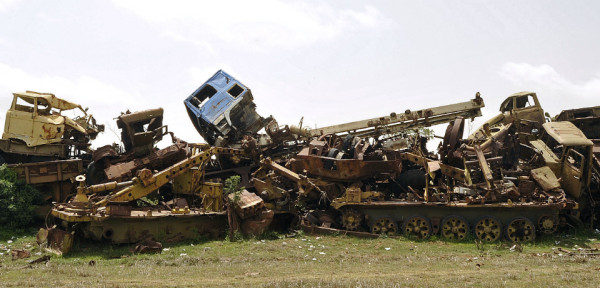PBS: Escaping Eritrea … [Read More...] about ካብ ውሽጢ ቤት ማእሰርታት ኤርትራ
North Korea on the Red Sea: Why Thousands of Migrants Are Fleeing Eritrea

Besides Syrians, no refugee population is trying to cross the Mediterranean Sea in greater numbers than Eritreans — or paying so heavy a price in lives lost beneath the waves. There’s been scant attention paid to why, but a 500-page U.N. report published Monday offers a detailed and disturbing explanation for why citizens of Eritrea are fleeing their country en masse: The country, the world body’s researchers concluded, is a modern-day police state where basic freedoms are restricted, and the population lives in fear that they will be informed upon by the secret police’s ubiquitous network of informants.
That means it’s little surprise that Eritreans are leaving in such eye-opening numbers. According to the U.N. report — written by a three-person committee and submitted to the U.N. Human Rights Council — some 5,000 Eritreans flee their country every month. As of October, there were about 200,000 Eritrean refugees living in Sudan and Ethiopia.
According to the U.N., these people are fleeing a veritable house of horrors: torture by regime forces, arbitrary arrest and imprisonment, disappearances of dissidents, total state control of the media, religious persecution, and mandatory military service that can last for undefined periods of time.
To maintain the rule of President Isaias Afwerki, the state relies on a massive mechanism of control that centers on the civil service and military. Youths are recruited to serve mandatory stints in the military that can be indefinitely extended. Conscripts are used as laborers and subjected to widespread abuse and torture.
The mechanism of repression in Eritrea is structured to enforce these tools of control. Travel documents are required to move around the country, mostly to catch those believed to have skirted military service. “In Eritrea everyone is a spy — local housewives, farmers, etc.,” one Eritrean told the U.N. “So they know when you arrive and when you leave. Your own neighbours report you to the authorities.”
The mechanism of spying and informing extends to the Eritrean diaspora, and U.N. investigators heard evidence of forced repatriations of exiles back to Eritrea. Fearful of its enemies abroad, the Afwerki regime tries to keep tabs on dissident groups there through its network of spies. One former spy testified to U.N. investigators that he had reported directly to the Eritrean consul while working in an undisclosed city. Exit visas are difficult to obtain.
The media remains under the total control of the government, and journalists critical of the government have been rounded up and arrested, according to the report.
The administration of justice, meanwhile, remains deeply arbitrary and is often marked by the use of torture. “Most of the suspects confessed under duress and/or torture and since they did not know the difference between courts and the police, judges had to convince them to tell the truth, if they were tortured or not,” one former judge told the U.N. investigators. “I used to meet detainees with bruises and trauma. I could see the brutality of the police in the eyes of the suspects. Some came tortured and beaten and others came with a tremendous fear that looked eternal.”
The daughter of one prominent dissident described how her father was simply taken by the government: “He simply disappeared off the face of the earth.”
Torture is a widespread tool in the Eritrean prison system, as are secret detention facilities. “They tortured me for four months,” said one man who was held in an underground prison. “I was electrocuted on the forearms and upper arms.… I was tied with my arms between my legs and chest bent forward. A rope was tied under my knees and behind my neck. On other occasions, my hands and legs were tied behind my back and I was left lying on my chest. I was beaten while tied. It is so horrific, you just say whatever they want you to say.”
This is but a small sample of the widespread human rights violations that occur in Eritrea and gives some sense of why the country’s citizens are so eager to attempt a perilous crossing of the Mediterranean.
With hundreds of desperate migrants drowning every month, European leaders have variouslypledged to destroy smuggler vessels and launch military operations to stem the flow of refugees. If this new report is any indication, there is remarkable lack of thinking as how to improve the places that are sending the migrants that European capitals are desperate to halt onto the seas in the first place.
